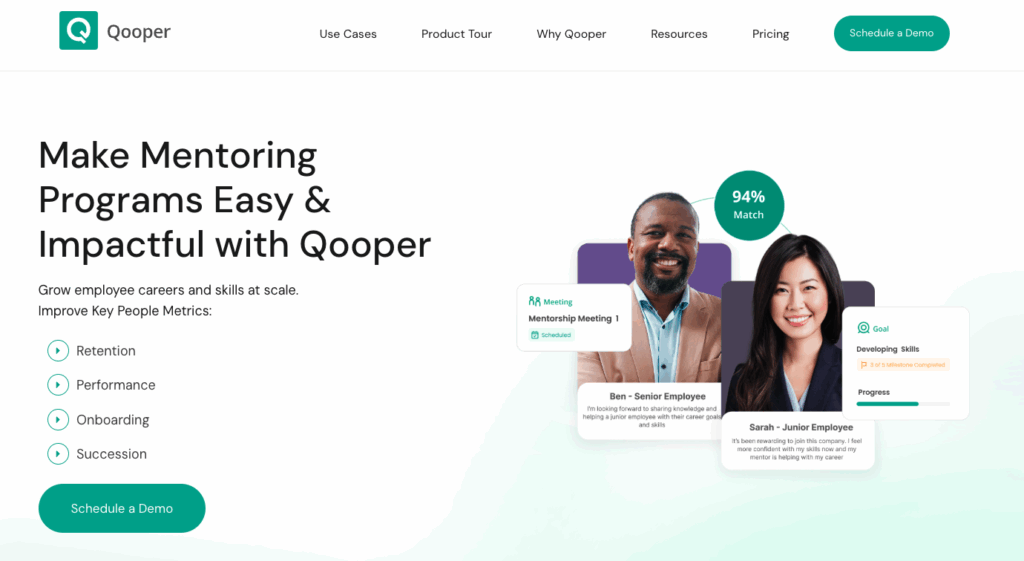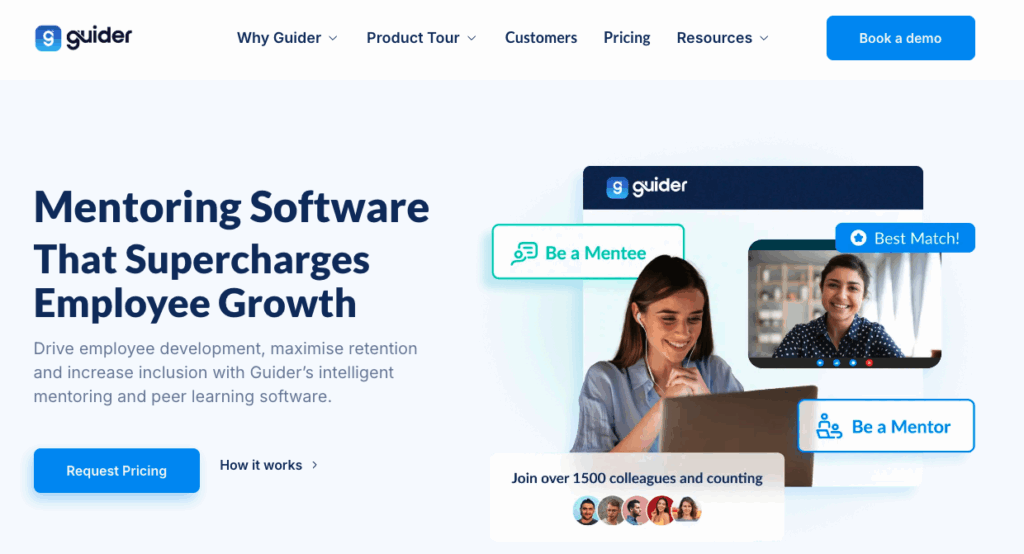Why Innovative Mentoring Software is Key
Employee engagement is facing a serious plateau. Gallup reports only 33% of employees felt engaged at work in 2023—a marginal uptick from the year before. The cost of this disengagement? An estimated $1.9 billion in lost productivity across U.S. businesses annually.
In response, many organizations are turning to mentoring—and rightly so. Research shows that employees who have a mentor report higher levels of job satisfaction, organizational commitment, compensation and promotions. But as more companies explore digital solutions to support mentoring, it’s important to recognize a key truth: not all platforms are built for the scale, engagement and strategic impact today’s enterprises demand.
Choosing the right mentoring software can streamline the matching and reporting process, and integrating solutions like those offered by Chronus can make it simple and straightforward. As the most flexible mentoring platform on the market, Chronus sets the gold standard for how organizations should design, deliver and grow high-impact programs.
Organizations can maximize the many mentoring program benefits for both employers and employees when investing in tools like mentoring software. In this article, we’ll unpack what makes mentoring software effective—and why the right partner can make all the difference in delivering real employee success.
Mentoring Software 101
Every organization will have different needs and realities when starting a mentoring program. Often programs start in an informal or manual environment. While this can be a good way to get started, manual programs can lead to a lot of extra work and hours for admins to facilitate the program. In addition, informal mentoring can end up excluding certain employee groups, whether intentional or not, due to the lack of structure or promotion of the program. Other challenges of manual mentoring programs or informal programs tend to look like this:
- Trouble scaling to more than 100 people or across functions, locations, countries
- Poor mentoring matches
- Little to no guidance or training for mentoring partners
- Inability to measure mentoring impact on business objectives
- Unable to systematize program communications and feedback
When an organization decides to use mentoring in the workplace, various mentoring styles may better suit one organization over another. Here are four different, but common types of mentoring styles.
Types of Mentoring Programs and How Software Supports Each
- Traditional one-on-one mentoring programs—where a junior employee is matched with a mentee who is more experienced in their career. Software makes it easy to match people quickly and efficiently.
- Mentoring circles—where employees support each other in tackling a common issue or learning a new skill together. The benefits of mentoring circles can be varied. Mentoring program management software enables employees to choose from a marketplace of circle topics.
- Group mentoring—a mentor is assigned to mentor a small group of employees. This is a great option for organizations where the number of mentee demands outweighs the mentor supply. Software enables this 1 to many style so more employees are learning, even if there are fewer mentors.
- Reverse mentoring—where the junior employee mentors a senior employee on aspects of the workplace the junior employee has more experience with, such as technological practices or generational differences. Mentoring program system software can identify the right matches for these types of connections while serving up the appropriate resources for mentors and mentee so both partners will be successful.
No matter what mentoring programs the company chooses to launch, investing in a mentoring platform can help set the company up for success.
How is Mentoring Valuable to Leadership?
Mentoring provides a direct connection to experiential or social learning. This allows employees to learn in real-time to learn from each other the skills and knowledge necessary to be successful in their roles, while furthering the skillset of the organization. Mentoring helps leaders sharpen essential skills like feedback, empathy, and strategic thinking, while building stronger connections across the organization. Existing leaders should mentor future generations, while future leaders should actively seek out and receive mentoring as part of their leadership journey.
The best mentoring software can automate labor-intensive tasks, organize and track the relevant metrics and showcase what’s working well for the company and what they might need to tweak and work on.
Features of the Best Mentoring Software Providers
While every mentoring program has different needs, the best corporate mentorship software shares core features that ensure success and scalability. The best mentoring software should alleviate the burden that launching a company-wide mentoring program can bring.
What to Look for in Corporate Mentorship Software
No matter your organizational needs, pay attention to the following features when choosing mentoring software. These considerations should go beyond mentoring software pricing to include all aspects connected to your intended outcomes. The right solution should scale with your growth while reinforcing your culture and goals.
Matching
This is a make-or-break component of mentorship, and often the most time-consuming. Compatible mentors and mentees have mutually beneficial relationships that can lead to higher engagement and job satisfaction, while incompatible mentors and mentees will likely lead to the opposite. The best mentor management software platforms should incorporate a rigorous matching element with criteria relevant to the organization’s goals and reality.
Guided Mentoring
Guided mentoring in a mentoring software platform ensures that every mentoring relationship has a clear structure, with defined goals, milestones, and support. It helps participants stay on track, making the experience more effective and meaningful for both mentors and mentees. By offering built-in guidance, the platform reduces guesswork and creates consistent, high-quality development experiences at scale.
Reporting
Tracking and reporting is an important part of any successful mentoring program. The right mentoring platform should provide relevant metrics that allow companies to assess what’s working and what isn’t. In addition, it should provide data points that can generate a report to assess the program’s return on investment (ROI).
Ease of Use
Mentoring software should be intuitive and easy to use. Look for tools that don’t have a steep learning curve so that users don’t have to spend a lot of extra time learning the tools on top of their daily responsibilities.
Integrations
A great mentor management tool should be easily integrated with the tools that you already have in your organization—whether that be a calendar, video communication or electronic messaging. This avoids creating additional work or unnecessary administrative time. See a list of our best mentorship software integrations to learn more.
Scalability
Many organizations might want to launch a mentorship program at a small scale before committing to rolling it out company-wide. The right software should allow them to do that so that they can evolve and scale at their own pace.
Support
Mentoring software should make the management of mentoring programs easier, not harder. And when things go wrong, companies need to be confident that the customer support team can fix it promptly.
Personalization
The ideal mentoring software should provide the ability for companies to standardize their programs while allowing room for personalization. Whether that be a flexible interface or the ability to add and remove features, companies should be able to tailor the tool to their needs.
Reviewing the Best Mentoring Software Choices
With so many mentoring platforms on the market, it can be challenging to identify which solution truly fits your organization’s needs. This section breaks down top mentoring software options to help you make an informed, strategic choice.
Chronus: Best Mentoring Platform for Enterprise Success
Pricing: Starting at $15,995
Chronus is the premier mentoring platform designed for organizations that need both simplicity and scalability. Chronus enables companies to evolve from small pilots to global mentoring programs without losing control or consistency. With guided mentoring, the Chronus mentoring software platform makes mentoring engagement low-prep and high impact. Their suite of functionality gives organizations the tools to grow talent, boost engagement, and drive measurable business outcomes with confidence.
Key Features:
- Guided Mentoring: In-platform structured prompts and agendas empower mentors and mentees to navigate meaningful discussions with ease, reducing the drop-off rate, and increasing participant satisfaction.
- User-Friendly Experience: Designed for all users—from first-time mentees to seasoned executive mentors. Providing a simplified and more personalized experience to improve mentoring participation and facilitate more efficient and impactful programs.
- ROI Reporting: Provides executive dashboards that offer at-a-glance visibility into connection health. Its advanced reporting features deliver filterable, exportable data on meeting frequency, progress tracking, retention, advancement and beyond.
- Scalable Design: Easily expands from local teams to global, cross-functional initiatives. Made for your needs today, while growing with your future aspirations.
- Seamless Integrations: Syncs with HRIS, LMS, Teams, Slack and more to reduce admin overhead and meet your people where they already are.
Unlike other mentoring software programs, Chronus mentoring platform software is built with a deep understanding of what it takes to engage employees, grow talent, and drive measurable impact—whether your workforce is in the office or distributed around the globe.
Whether you’re launching a leadership track, onboarding new hires, or supporting career development across a global team, Chronus offers the only mentoring software platform with the intelligence, tracking, and usability to scale success.
Qooper: Best For Budget-Conscious Buyer
Pricing: Not Listed
Qooper is a straightforward system that combines ease of use with features tailored for learning and development. Its admin tools make it easy to launch programs quickly.
Key Features
- Smart Matching – Supports admin-matching or self-selection options
- Goal Setting & Tracking – Create development goals within mentorship connections
- Communication Tools – In-app chat and messaging
- Automated Workflows – Automated reminders for check-ins
While it’s a strong option for small to mid-sized organizations, the platform’s interface isn’t as modern or polished as some competitors, and users have occasionally reported hiccups with calendar integrations and customization limitations, especially around branding, profile fields, and survey tools.
For smaller or mid-sized teams with straightforward goals, Qooper offers good value, but companies seeking deep integration flexibility and highly polished UX may find themselves wanting a bit more.
Together Platform: Best for ‘Out-of-the Box’ programs
Pricing: Starting at $10,000
Together Platform offers a mentoring solution aimed at simplicity, making it a reasonable choice for companies looking to launch basic mentoring programs. It includes core functionalities.
Key Features:
- Mentor-mentee Matching
- Scheduling Integrations
- Participant surveys to support smaller-scale initiatives
- Templates and guidance for program setup
- Clean, simple experience
- Email nudges
For teams new to mentoring software or those looking to engage small employee programs, Together provides an approachable solution. However, where companies can get into trouble—especially for enterprises—is in the areas of customization and long-term program maturity. Together lacks a robust guided mentoring framework that provides structure within the mentoring relationship itself, which can lead to inconsistent participant experiences and higher drop-off rates. Its reporting tools, while functional, offer limited depth for connecting mentoring to broader business outcomes.
For organizations seeking a mentoring platform that evolves alongside their workforce and provides enterprise-level tracking, analytics, and configurability, Chronus remains the clear leader.
MentorcliQ: Best For Heavy-Handed Admin Programs
Pricing: Not Listed
MentorcliQ is a mentoring software platform designed to help organizations launch and manage their employee mentoring programs. The platform supports various types of mentoring formats and provides administrative support to streamline program setup and execution.
Key Features:
- Automated Matching Algorithms
- Multiple Mentoring Formats
- Enrollment & Onboarding Workflows
- Reporting & Progress Tracking
- Integrated Nudges & Reminders
- Multi-Program Management
MentorcliQ is best suited for organizations that value structure above all else—particularly those that prefer a highly prescriptive, top-down approach to mentoring. Its platform shines when programs are managed by dedicated administrators who have the time (and patience) to navigate a feature-rich but somewhat rigid system.
Admins have also noted limitations in areas like branding, customizable reporting, and user search functionality. MentorcliQ is well-suited for structured, top-down programs, but may be less adaptable for organizations that prioritize agility, customization, or a more modern user experience.
Guider: Best for Beginners
Pricing: Starting at $9,000
Guider is a mentoring platform designed to help organizations quickly launch mentoring programs with minimal setup. The platform also supports multiple mentoring styles and includes tools for progress tracking, feedback collection, and light reporting.
Key Features:
- Automated Matching – pairs partners across profile fields
- Program Templates – Pre-configured workflows to help launch programs quickly with minimal admin setup.
- Admin Dashboard – Centralized view for program managers to monitor participation and engagement.
- Integrations – Basic integration with tools like Microsoft Teams and calendar platforms (varies by plan)
The platform supports multiple mentoring styles and includes tools for progress tracking, feedback collection, and light reporting. That said, Guider tends to appeal most to organizations with relatively straightforward needs. Its integrations and analytics capabilities are more limited, which may pose challenges for enterprises looking to connect mentoring outcomes with broader HR systems or performance data.
Guider is a strong fit for companies looking to build a mentoring culture without a heavy lift, but those seeking granular control or enterprise-level scalability may find themselves constrained by the platform’s simplicity.
How to Choose the Best Mentoring Software for Your Organization: A Step-by-Step Guide
Finding the right company mentoring software means aligning the platform’s capabilities with your organization’s goals, size and budget. Here’s a simple guide to help you evaluate and compare options effectively.
1. Define Your Mentoring Goals
Start by clarifying what you want to achieve. Whether it’s upskilling employees, promoting leadership development, or advancing DEI initiatives, your goals will shape your choice. Some mentoring management system software is better suited for training and development, while others specialize in creating inclusive mentorship networks.
2. Evaluate Scalability
Think about how your program might evolve. Will it need to support a growing number of participants or new mentoring formats like group or reverse mentoring? If you’re wanting to run programs across your employee lifecycle, as well as your organization, you’ll want a platform that can handle the load, scale and has done it before. Choose a solution that can scale with your business and adapt to future needs.
3. Match Features to Your Organization’s Size
Different platforms cater to different business scales. Smaller companies may benefit from lightweight tools with basic matching, while large enterprises often require robust systems with advanced data tracking and integrations. Be sure the platform fits your current size—and your plans for growth.
4. Consider Customization and Customer Support
Not all software is created equal when it comes to customization. Customization is key to aligning mentoring software with your brand and program structure. Look for platforms that allow you to tailor the user interface, workflows, and matching criteria to reflect your organization’s goals and culture. This flexibility ensures the mentoring experience feels integrated—not like a bolt-on solution.
Equally important is the level of customer support provided. Reliable onboarding, ongoing technical assistance, and access to best practices or strategy consultations can make a significant difference in your program’s success. Some vendors offer dedicated support teams, while others provide more self-service options. Evaluate which model best suits your internal capabilities and program maturity.
5. Review Mentoring Software Pricing Models
Mentoring software pricing typically follows a subscription model—monthly or annually—and often varies by the number of active users. Some vendors offer pricing tiers based on usage ranges (e.g., under 100 users vs. 1,000–5,000), while others charge per user. Understand how costs align with your budget and determine whether the pricing structure supports long-term program sustainability.
Choosing the right mentoring management system software is a strategic investment. With this guide, you can narrow your options and select a platform that supports both your immediate mentoring goals and your organization’s long-term development.
Which is the best mentorship software for business?
The best mentorship software for business is Chronus, especially for organizations focused on scale, engagement, and measurable impact. Chronus stands out with its guided mentoring functionality, which provides guidance and meaningful connection that keeps mentoring relationships on track and effective. The platform includes a comprehensive mentor tracking system with real-time dashboards, advanced reporting, and leadership-ready analytics that tie mentoring to key business outcomes. With seamless integration into systems like Workday, Teams, and Slack—and a user-friendly design that supports both in-office and remote teams—Chronus offers the most powerful, scalable solution for organizations serious about mentoring.
How to Evaluate Mentoring Platforms to Find the Best Software for You
Choosing the best corporate mentorship software is crucial for the success of your organization’s mentoring program. By carefully considering factors like ease of use, budget, scalability and platform compatibility, you can ensure that your program meets the diverse needs of mentors and mentees.
For organizations that are serious about scale, participant engagement, ROI, and long-term flexibility, Chronus stands out as the mentoring platform built to deliver lasting impact. With guided mentoring tools that drive meaningful connections, enterprise-grade analytics that demonstrate business value, and a user experience that supports global teams without added complexity, Chronus is more than just software—it’s a strategic growth enabler.
With the right software in place, your organization can effectively facilitate mentorship, encourage professional growth and drive overall success.





